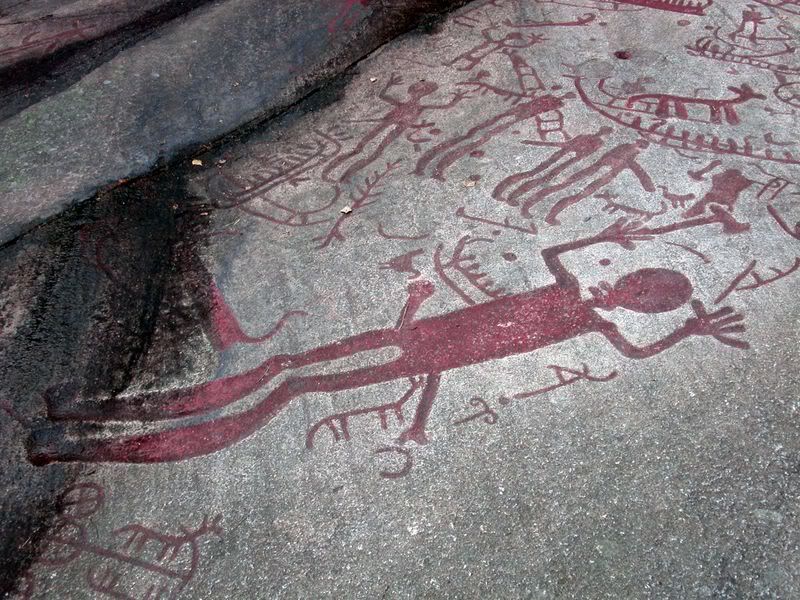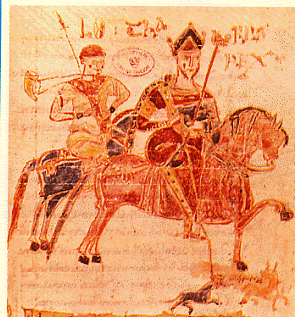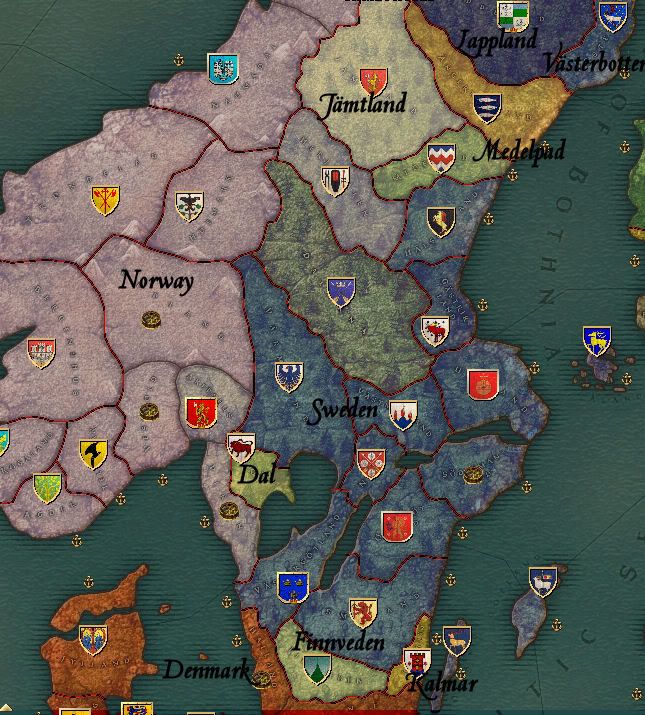- Introduction - In the dark forests of the north.
Introduction
It is winter. The snow glistens on the sloped roofs of the cottages. Small puffs of smoke escapes through the chimneys of the houses around the town square. Underneath the caked snow and ice on the walls you can still see the blood coloured paint of the houses. The cold wind blows from the north and it bites through any amount of clothes. From an almost cloudless sky there drifts lazily through the wind snowflakes as large as coins.
Outside the icy wind is filled with the repugnant stench of the tannery, the smell of beer and ale from the tavern and even the aroma of burning juniperwood from the butchers smokery.
In the streets and alleys of the town you can see footprints in the snow. It looks more like the people have been shambling than walking. The footprints all converge on one point. The town's church, overlooking this idyllic winter landscape from a small hill. For this was sunday morning and like all catholics the dwellers of this town had to go to mass. Even more so now when the time was near the annual festivities commemorating the birth of their lord and saviour Jesus Christ.
But the footprints stop outside the church and as the sun shines upon the mountains to the north, anyone can discern that these people should have been in church long ago. Yet they stand on the slope leading up to the church; captivated by the speaker in front of them.
The man on the slope speaks a dialect weird to their ears. You can hear that he is not from around here. He speaks of atrocities committed in a town that seems just as far away from here. He speaks of a tyrant king and of crimes without comparison. He says the streets in the town and even the sky were the colour of their houses that fateful evening.

But let us leave this man and his quest, for he lives in another time, another world perhaps. Let us travel in time but let us stay in the same place.
The same town stands on the same place here. It is autumn and the green spruces surrounding the town seem darker, more foreboding than before. There is no church on the hill, indeed there is nothing there but a hill.
For the people of this time do not believe in this "White Christ" and in a field outside the town one can still see the withered remains of a maypole. It has toppled, the once colourful flowers decorating the pole are long since a grey-orange mockery of what they once were.
This heathen tradition will continue long after the inhabitants of this land have been converted to christianity. It will still be a celebration, but it will not hold the same promises of fertility in the years to come.
But now the people believe in the power of the gods. So much in fact that they each winter pay a tribute in blood to their gods. Not many years before; it was done in the same fashion in a town east of here, but that which once was is now long gone. They are believers of a dying religion. Very few believe anymore.
Alas not even their own ruler does.
------------------------------------------------------------------------
Well that was my little introduction to this AAR. Hope you like it
I'll be playing a county in Europe, which one you'll have to guess. The actual playing will not start now, the first few posts will centre on the background and a few characters. First one to guess which county can get to decide something in the AAR later on.
English is not my first language so I'd be happy if you could help me with any grammar or spelling mistakes I might make one time to often.
Oh and any encouragement is greatly appreciated
Introduction
It is winter. The snow glistens on the sloped roofs of the cottages. Small puffs of smoke escapes through the chimneys of the houses around the town square. Underneath the caked snow and ice on the walls you can still see the blood coloured paint of the houses. The cold wind blows from the north and it bites through any amount of clothes. From an almost cloudless sky there drifts lazily through the wind snowflakes as large as coins.
Outside the icy wind is filled with the repugnant stench of the tannery, the smell of beer and ale from the tavern and even the aroma of burning juniperwood from the butchers smokery.
In the streets and alleys of the town you can see footprints in the snow. It looks more like the people have been shambling than walking. The footprints all converge on one point. The town's church, overlooking this idyllic winter landscape from a small hill. For this was sunday morning and like all catholics the dwellers of this town had to go to mass. Even more so now when the time was near the annual festivities commemorating the birth of their lord and saviour Jesus Christ.
But the footprints stop outside the church and as the sun shines upon the mountains to the north, anyone can discern that these people should have been in church long ago. Yet they stand on the slope leading up to the church; captivated by the speaker in front of them.
The man on the slope speaks a dialect weird to their ears. You can hear that he is not from around here. He speaks of atrocities committed in a town that seems just as far away from here. He speaks of a tyrant king and of crimes without comparison. He says the streets in the town and even the sky were the colour of their houses that fateful evening.

Gustav Vasa speaking to the Dalecarlians
But let us leave this man and his quest, for he lives in another time, another world perhaps. Let us travel in time but let us stay in the same place.
The same town stands on the same place here. It is autumn and the green spruces surrounding the town seem darker, more foreboding than before. There is no church on the hill, indeed there is nothing there but a hill.
For the people of this time do not believe in this "White Christ" and in a field outside the town one can still see the withered remains of a maypole. It has toppled, the once colourful flowers decorating the pole are long since a grey-orange mockery of what they once were.
This heathen tradition will continue long after the inhabitants of this land have been converted to christianity. It will still be a celebration, but it will not hold the same promises of fertility in the years to come.
But now the people believe in the power of the gods. So much in fact that they each winter pay a tribute in blood to their gods. Not many years before; it was done in the same fashion in a town east of here, but that which once was is now long gone. They are believers of a dying religion. Very few believe anymore.
Alas not even their own ruler does.
------------------------------------------------------------------------
Well that was my little introduction to this AAR. Hope you like it
I'll be playing a county in Europe, which one you'll have to guess. The actual playing will not start now, the first few posts will centre on the background and a few characters. First one to guess which county can get to decide something in the AAR later on.
English is not my first language so I'd be happy if you could help me with any grammar or spelling mistakes I might make one time to often.
Oh and any encouragement is greatly appreciated
Last edited:






